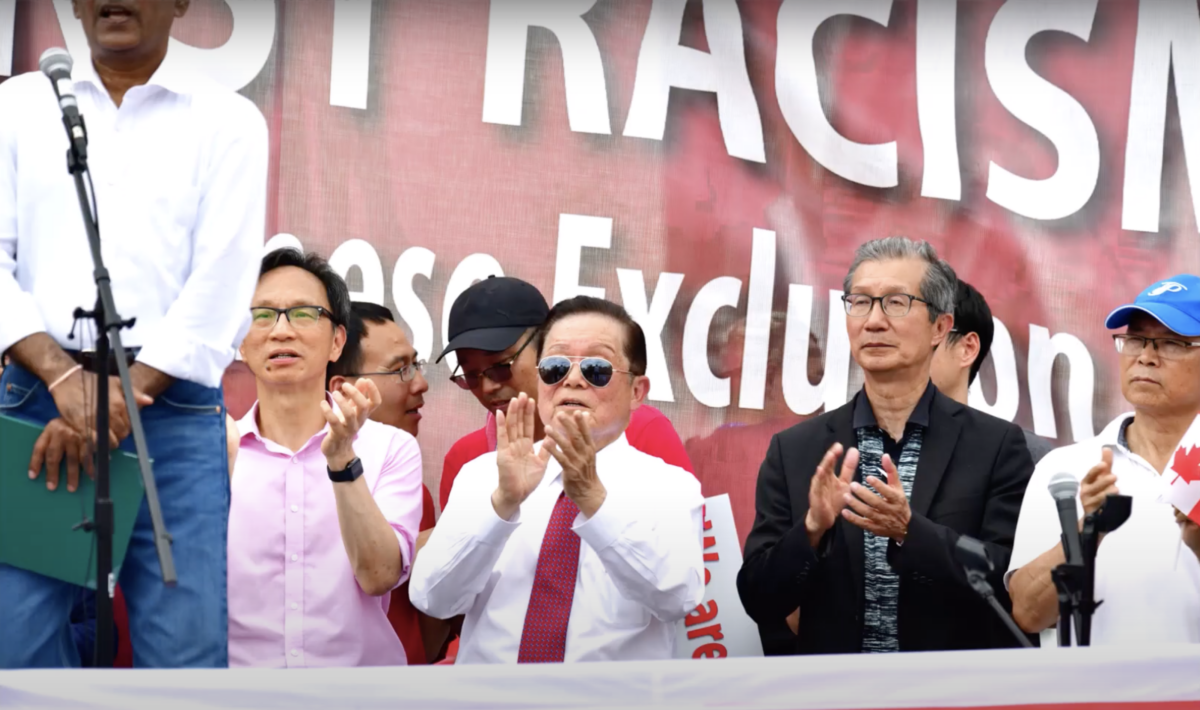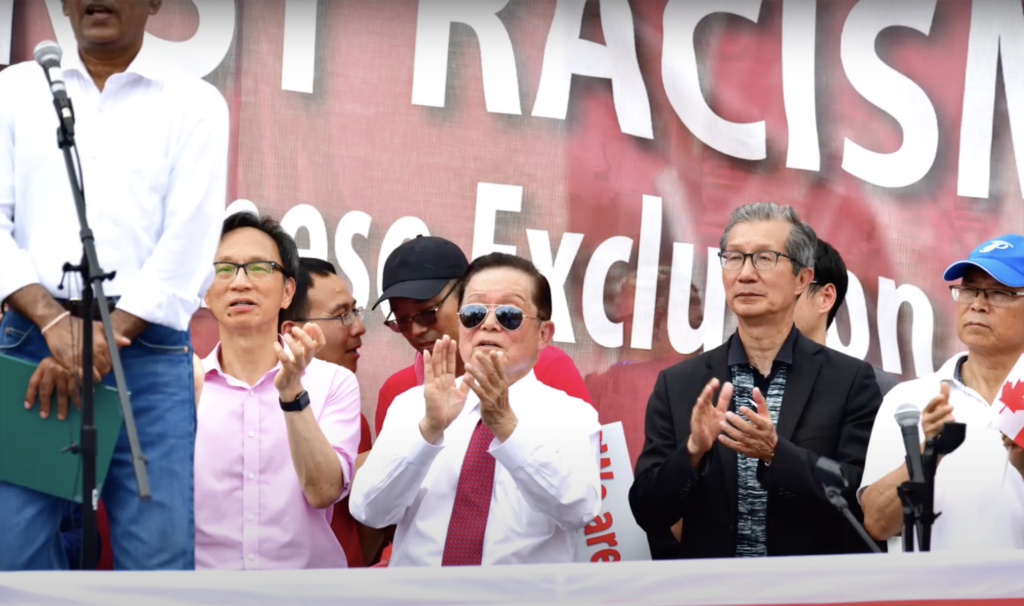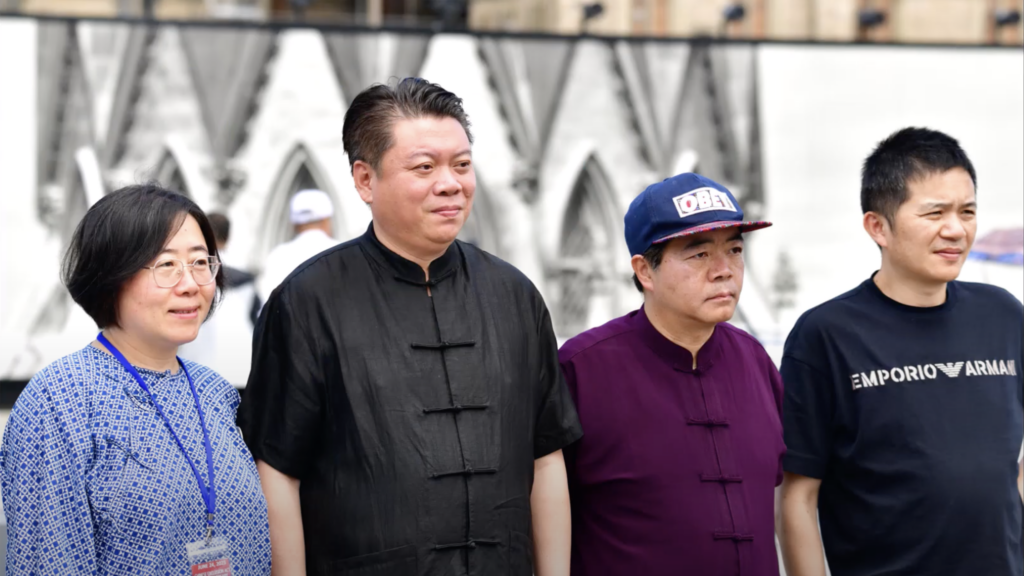
Bob Mackin
Attempts to link the proposed registry of foreign agents with the centennial of a discriminatory law play into the hands of the Chinese government, says a human rights advocate.

Senators Yuen Pau Woo (left) and Victor Oh, with Ontario politicians Michael Chan and Vincent Ke, applauding Trudeau Liberal backbencher Chandra Arya on June 24 at Parliament Hill (CCMedia/YouTube)
Senators Victor Oh (Ontario) and Yuen Pau Woo (B.C.) co-hosted a remembrance ceremony in Ottawa on June 23 for the 1923 Chinese Immigration Act, also known as the Chinese Exclusion Act. With exceptions for students, merchants, diplomats and Canadians born in China, immigration from China was banned until 1947 when the law was repealed. Prime Minister Stephen Harper apologized in 2006.
A rally took place at Parliament Hill and the Supreme Court on June 24.
Ivy Li of the Canadian Friends of Hong Kong said that the senators are using public money and resources, and their official platform, to “serve a foreign dictatorship’s interest.”
“The goal is very obvious,” Li said. “The Exclusion Act, of course, is a terrible, racist history that all Canadians should know and all of us should remember that something like that actually has happened in Canada. Using that to say that what we are doing today can be the repeat of that, and take it totally out of context, is the common strategy of [the Chinese Communist Party’s] racist card and victimhood card.”
Woo also helped draft the April-launched e-petition against such a registry. Sponsored by backbench Liberal MP Chandra Arya (Nepean), the e-petition’s initiator is Coquitlam activist Ally Wang. With three weeks to go, it has more than 2,400 supporters, exceeding the 500 minimum for presentation to the House of Commons.
In 2021, Wang co-founded the Stop Anti-Asian Hate Crimes Advocacy Group Association of Canada (SAAHCAG) and the Chinese Canadians Goto Vote Association (CCGVA). During the 2021 federal election, supporters of the latter group helped Liberal Parm Bains upset Kenny Chiu, the Conservative incumbent who originally proposed the foreign agents registry and voted to condemn China for committing genocide against Uyghur Muslims.

Coquitlam activist Ally Wang (left) and Toronto United Front leader Weng Guoning on Parliament Hill June 24 (CCMedia/YouTube)
At a news conference on March 16, Woo said the 1923 law was the result of “groupthink” and rejected a reporter’s suggestion that he is cozy with the Chinese government.
“Think about all the other Chinese people who don’t have my privilege or my protections,” Woo said. “Are they going to be accused of being fifth columnists, because of the views they hold? Are we going to have a foreign influence registry, that’s going to use the views that one holds as the litmus test of being a foreign agent?”
Wang was featured in a March 21 report by pro-Beijing Phoenix TV about leaks from the Canadian Security Intelligence Service alleging Tong Xiaoling, China’s former top diplomat in Vancouver, meddled in Canadian elections to help candidates friendly to China. Wang said that memorial activities would help fight systemic racism against not only Chinese, but Indigenous, African and Muslim communities, “because we all face the same white supremacy.”
Li said such a message stokes resentment and fear between ethnic communities.
“If we want a multicultural society to succeed, we have to be very aware of these kinds of divide and control tactics, from regimes like the CCP, like Russia,” she said.
Wang, who traveled to Ottawa, said she was unavailable for an interview, but referred a reporter to Ivan Pak, who co-founded the two associations and is also in Ottawa. Pak, who ran for the People’s Party of Canada in Richmond Centre in 2019, said he supports Wang’s petition because he does not want the Chinese-Canadian community to “become collateral damage.”
“I personally doubt about whether this registry is going to help,” Pak said.
Pak describes himself as “pretty much anti-CCP,” but admits some of the groups involved in commemorating the centennial and opposing the foreign agents registry have deep ties to the Chinese government and businessmen in Mainland China.

WeChat ad for the May 3 lecture by Ally Wang, who is behind an e-petition against a foreign agents registry.
“Some of them, they are not pro-CCP, but pro-China,” Pak said. “They want a strong China, they feel proud to have a strong China.”
However, a WeChat notice from the organizing committee of the rally tried to distance the event from the e-petition campaign. It asked participants not to raise the Chinese national flag, sing the Chinese national anthem or shout pro-China slogans.
Pak said SAAHCAG raised around $17,000 in January at a Sheraton Vancouver Airport Hotel banquet in memory of the 1923 law. He also said SAAHCAG paid for his and Wang’s airfare to Ottawa, but not accommodation.
The organization is the recipient of federal and B.C. government grants that he Pak says are separate from the petition. The $24,400 from Employment and Social Development Canada’s New Horizons for Seniors Program is a year-long project to promote volunteerism, mentoring, social participation and inclusion, and expand awareness of elder abuse, including financial abuse.
In April, the B.C. government announced $5,000 for SAAHCAG’s 123 Anti-Discrimination Exhibition, which is billed as “in memory of those affected by the Chinese Immigration Act.”
SAAHCAG now counts 15 directors, including unsuccessful 2022 Vancouver city council candidates May He of Progress Vancouver and Morning Lee of the NPA. During last fall’s campaign, Lee was in damage control after a so-called Chinese blessing video starring impoverished African children was found on the YouTube account for Lee’s real estate company.
SAAHCAG and CCGV supporters include Richmond’s Wenzhou Friendship Society, which is under an RCMP national security investigation for allegedly hosting an illegal Chinese police station.
Wang’s promotional campaign for the e-petition included a lecture via Zoom for seniors involved in the Mississauga, Ont.-based Chinese Age-well Research and Education (CARE). An ad for the May 3 event featuring Wag said “this project is supported by the Government of Canada.”
However, two departments that granted funds to CARE said it wasn’t.
Department of Canadian Heritage said it provided CARE $4,000 last September to commemorate Queen Elizabeth II. The $25,000 from ESDC’s New Horizons for Seniors program ended March 27, more than a month before the presentation.
“Given this, the organization is not able to claim that this event is related to funding received through the New Horizons for Seniors Program,” said Natalie Huneault, a communications manager with ESDC. “Of note, an event of this nature would not be allowable under the terms and conditions of the NHSP, and is not an eligible activity.”
CARE founder Weiguo Zhang, a University of Toronto sociology professor, did not explain why the ad said the May 3 lecture was federally sponsored. An April 23 hybrid symposium, that also included Wang, was supported by ESDC, he said by email.
Support theBreaker.news for as low as $2 a month on Patreon. Find out how. Click here.











